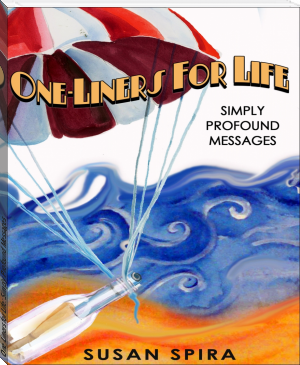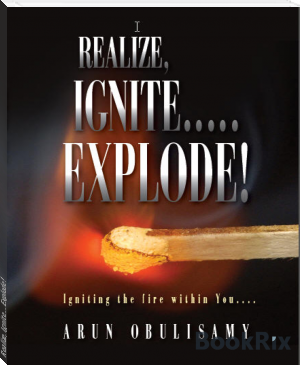Do You Still Laugh? Do You Still Sing? by Melinda Augustina (e ink epub reader .TXT) 📕

Read free book «Do You Still Laugh? Do You Still Sing? by Melinda Augustina (e ink epub reader .TXT) 📕» - read online or download for free at americanlibrarybooks.com
- Author: Melinda Augustina
Read book online «Do You Still Laugh? Do You Still Sing? by Melinda Augustina (e ink epub reader .TXT) 📕». Author - Melinda Augustina
After that, when I was packing to move, there were two doves sitting on the windowsill of the living room window. Isn’t that amazing! They just sat there for the longest time – cuddling.
And then in the flower box that day – a dove’s egg – very fresh – I could still see through the shell. Signs of spring, I guess – and certainly signs of new life, too.
Occasionally there are long moments where I don’t think of you at all and moments when my mind tricks me into thinking that you’re still alive. I mean, I know your spirit is alive, but you’re not here.
Life does go on.
Much love, M.
Dear Reader,
Even with my lack of preparation I have felt more prepared for death than most people I know. Mother and Daddy used to laugh about it all the time. When we were very young, Mother used to say to Daddy, “Don’t you dare die and leave me with all of these kids!” When people would ask Daddy to plan something too far in advance or ask him to do something that didn’t sound like fun, you could hear him say, “Uhhh - I think I have to go to a funeral that day.” When I was young, I thought - how does he know that? As I grew up it always made me laugh. Daddy bought his and mother’s space in the mausoleum and called it his
“file drawer.” He was very upfront about death.
When a young acting friend of mine died just a few weeks after my father’s passing, I was devastated. My mother refused to let me get dramatic about it. “Well, honey, we all have to go sometime,” was all she would say. And then she changed the subject.
Here are a few things to do when the parent of a friend dies:
If you can’t think of anything to say - don’t worry - you don’t have to say anything. Let your eyes talk - look softly and carefully into people’s eyes. They’ll feel that. Just tell them that you love them. Sometimes that’s enough. Or just let them hear your breath if you’re calling by phone. People can feel you.
Your presence speaks volumes and is usually the best gift. Depending on the circumstances there usually isn’t much to say - and everyone knows there isn’t much to say that won’t sound like a cliché. It’s a touching moment of humanity. Silence can work. Our culture needs new scripts for funerals.
Simply be there. At the funeral home, at the church, at the house.
“If you need anything . . .” Just so you know, the bereaved can rarely think of what they need. What I noticed is they need you to think of what they need as everyone’s brain kind of stops. If it’s an unexpected death, they are in shock. They won’t be thinking clearly for weeks, maybe even months.
When I returned to Dallas after my mother’s funeral in Kansas City, my refrigerator was full of beautiful food, set there by a brilliant friend - I never would have thought of that. Every gesture is appreciated. Ask around and see what others have done in similar situations.
Chop wood and carry water. The simple things. The laundry,
the dishes, taking out the trash, cutting the grass, the groceries, the
bathrooms. Stay with the children. Just show up and do them. There is much love in those acts.
Make sure they’re drinking enough water (very true).
Another friend came from California to stay with me for a few days when I returned to Texas and she did the groceries, the laundry, the driving. Showing up is a beautiful gift and makes the transition easier.
Tell stories and listen to the family tell stories. If you recall an experience you shared with the person who has passed away and that experience warms your heart - share that story. When my father passed away, one of the neighbors from our grade school years, Mrs. Vogrin, told us a story of an Easter Sunday. My father proudly showed her his 5 little girls and said, “Come look at my little flowers.” That is one of my favorite stories now and we never would have known that if she didn’t speak up. Telling stories is very important to lay down memory tracks in the brain.
If you cannot speak it, write it. If you cannot write it - ask someone else to write it for you. Every card and note works. The hand written expression carries the love and energy of the person who sent it and there is magic in that.
We received a note from a man who had known my mother in high school. He wrote the story that when he was feeling a little out of
place in their high school she made friends with him, remembered his name and made him feel esteemed. Almost sixty years after the fact, he remembered. That was a fabulous letter. From that letter I sense that none of our acts of kindness go unnoticed in the big picture.
Dance with them. Shortly after I returned to Dallas a friend took me dancing, that shook a big chunk of the heaviness out of my body and all of a sudden I remembered what it was like to dance and be happy. I would not have thought of that at that time. When I taught one of my nieces a dance, her mother was sure I was corrupting her, (and I was) but I noticed everyone got lighter. I remember after my grandfather’s funeral, Daddy said, “Man - I need a wedding!” and rushed right out that night and went to the wedding of a friend so he could dance. You’ll need someone to remind the family to dance. It doesn’t have to be vigorous - and it can be right at home. Even light movement will change the mood. Don’t rush it - just pay attention and you’ll see when it will work.
Check on their sleep patterns as they may be interrupted. A 3am wake-up grieving time is quite common. The body cleanses it’s internal
organs during sleep. 3am is when the lungs begin. It’s comforting when they learn they aren’t the only one who has woken up at 3am for a good cry.
Stay in touch. It’s over for the rest of us much sooner than those closest to the deceased. Sensitivities run high for a long time. If you find the family or individual running through your attention months later - that’s your clue. Send notes and make calls later on if your attention is perked in that direction. Being direct about it can work or pretend like you’re calling for another reason, if you want, and see what comes up. That can work, too.
Before your parents pass away here are a few things to consider:
Look carefully
at how to appreciate the life they have given you and then take time to express that appreciation. Be specific. For instance,
the chocolate and raspberry birthday cake they made for your fifth birthday. Whatever you remember. People light up when they see you’ve noticed the tiniest of details. God lives in the details.
Spend time with them that is not a holiday.
Go visit for no apparent reason and ask them to tell you stories of their courtship, their wedding, their career choices, their parenting days. What is the experience when the children leave, what is it like when the children come back? What is the experience when the grandchildren come? What have they always wanted to tell you that they held back? What was their experience when their parents passed away? Anything you can think of. There is a beautiful book called Questions for My Father by Vincent Staniforth. I highly recommend it.
Sort through photos
(that will spark a lot of stories). Most of our family photos were stashed in boxes and envelopes. Mother didn’t like putting attention on the past - she mostly liked living right here and now. If your photos are also in boxes, organize the photos into albums while your parents are still here. You’ll learn a lot. Invest in the truly
exquisite albums with leather bindings and archival quality paper. Your family deserves that respect.
The Christmas just before Daddy died, we made a little comedy book for him with photos and stories that were hilarious accounts of our outrageous family history. (With nine children, there was no such thing as an ordinary day.) We all presented it to him with great ceremony on what would be his final Christmas day. We read it out loud and laughed and cried. He had given us a good, good life. It was our way of showing him how much we loved and appreciated him being our father. I love that book. I could look at it a thousand times and never tire of it. Please don’t wait until your parents are dying to do this. It’s a beautiful gift.
These are just a few thoughts - observe your parents with love and you’ll easily make up your own ideas of things you want to do with them and for them - right now.
When your parents pass away here are a few things to consider :
Don’t be too strong.
There are many people who want to do things for you at this time - let them. Let them do every little thing they desire to do. And ask for assistance with every little thing you have to do. I asked a long-time family friend to ride with me to the health-food
store very late one night and she was pleased to do it. It seems like such a simple little thing - ride with me to the store - but we had time to talk privately in a way prior circumstances had never allowed. One friend heard me say I wanted a soda while I was sitting at the dining room table and “poof” seconds later it was by my side. (See? A little piece of heaven.)
Take your time.
Leave the bedroom and perhaps the desk of the deceased undisturbed for as long as you can. You can feel their presence among those things for quite a while. We invaded Mother’s room probably a little too early. This was brought to my attention by my sister Theresa. She was right. Mother’s shoes were where she had left them - some clothing, her hairbrush. These things become very precious when you know they are exactly where your loved one left





Comments (0)